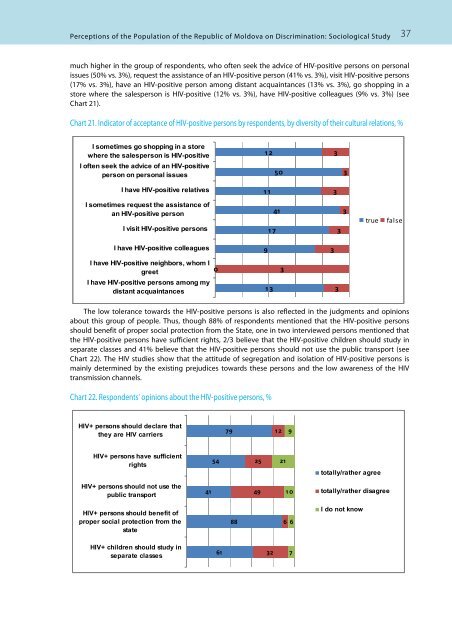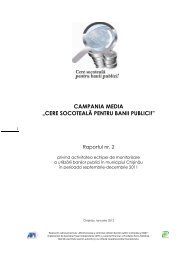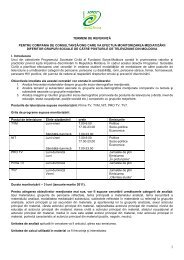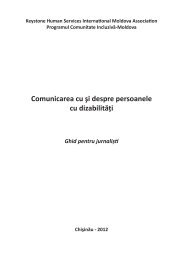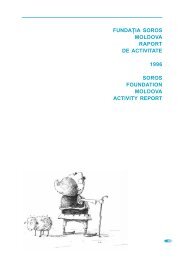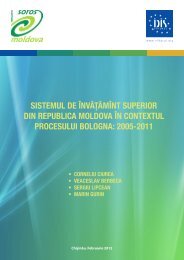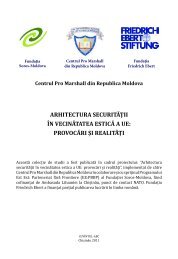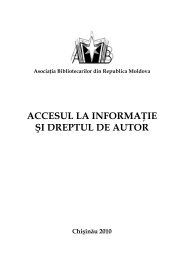Perceptions of the Population of the Republic of Moldova - Soros ...
Perceptions of the Population of the Republic of Moldova - Soros ...
Perceptions of the Population of the Republic of Moldova - Soros ...
- No tags were found...
Create successful ePaper yourself
Turn your PDF publications into a flip-book with our unique Google optimized e-Paper software.
<strong>Perceptions</strong> <strong>of</strong> <strong>the</strong> <strong>Population</strong> <strong>of</strong> <strong>the</strong> <strong>Republic</strong> <strong>of</strong> <strong>Moldova</strong> on Discrimination: Sociological Study 37much higher in <strong>the</strong> group <strong>of</strong> respondents, who <strong>of</strong>ten seek <strong>the</strong> advice <strong>of</strong> HIV-positive persons on personalissues (50% vs. 3%), request <strong>the</strong> assistance <strong>of</strong> an HIV-positive person (41% vs. 3%), visit HIV-positive persons(17% vs. 3%), have an HIV-positive person among distant acquaintances (13% vs. 3%), go shopping in astore where <strong>the</strong> salesperson is HIV-positive (12% vs. 3%), have HIV-positive colleagues (9% vs. 3%) (seeChart 21).Chart 21. Indicator <strong>of</strong> acceptance <strong>of</strong> HIV-positive persons by respondents, by diversity <strong>of</strong> <strong>the</strong>ir cultural relations, %I sometimes go shopping in a storewhere <strong>the</strong> salesperson is HIV-positive123I <strong>of</strong>ten seek <strong>the</strong> advice <strong>of</strong> an HIV-positiveperson on personal issues503I have HIV-positive relatives113I sometimes request <strong>the</strong> assistance <strong>of</strong>an HIV-positive personI visit HIV-positive persons174133truefalseI have HIV-positive colleagues93I have HIV-positive neighbors, whom Igreet03I have HIV-positive persons among mydistant acquaintances133The low tolerance towards <strong>the</strong> HIV-positive persons is also reflected in <strong>the</strong> judgments and opinionsabout this group <strong>of</strong> people. Thus, though 88% <strong>of</strong> respondents mentioned that <strong>the</strong> HIV-positive personsshould benefit <strong>of</strong> proper social protection from <strong>the</strong> State, one in two interviewed persons mentioned that<strong>the</strong> HIV-positive persons have sufficient rights, 2/3 believe that <strong>the</strong> HIV-positive children should study inseparate classes and 41% believe that <strong>the</strong> HIV-positive persons should not use <strong>the</strong> public transport (seeChart 22). The HIV studies show that <strong>the</strong> attitude <strong>of</strong> segregation and isolation <strong>of</strong> HIV-positive persons ismainly determined by <strong>the</strong> existing prejudices towards <strong>the</strong>se persons and <strong>the</strong> low awareness <strong>of</strong> <strong>the</strong> HIVtransmission channels.Chart 22. Respondents' opinions about <strong>the</strong> HIV-positive persons, %HIV+ persons should declare that<strong>the</strong>y are HIV carriers79129HIV+ persons have sufficientrights542521totally/ra<strong>the</strong>r agreeHIV+ persons should not use <strong>the</strong>public transport414910totally/ra<strong>the</strong>r disagreeHIV+ persons should benefit <strong>of</strong>proper social protection from <strong>the</strong>state886 6I do not knowHIV+ children should study inseparate classes61327


